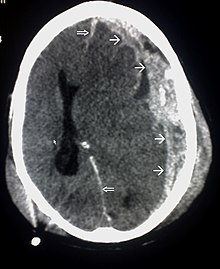
Back ارتجاج الدماغ Arabic Страсенне галаўнога мозга Byelorussian Мозъчно сътресение Bulgarian ཀླད་མཚོ་འཁྱོམས་པ་ ཀླད་འཁྱོམས་ Tibetan Commoció cerebral Catalan Otřes mozku Czech Hjernerystelse Danish Gehirnerschütterung German Εγκεφαλική διάσειση Greek Concussion English



Concussion is an injury to the brain caused by being hit on the head, as often happens in motor vehicle collisions, fights or contact sports such as football. It is the most common form of traumatic brain injury. Related terms include mild brain injury, mild traumatic brain injury (MTBI), mild head injury (MHI), and minor head trauma. Patients with severe concussion are occasionally monitored in hospital. The main reason for this is the risk of bleeding in the brain, which can be life-threatening.
Common symptoms of concussion include: headache, dizziness, fatigue, problems with vision, confusion and loss of consciousness. A person with a mild concussion may have nothing more than a headache or confusion for a while. In more severe cases, symptoms tend to last longer, and may include loss of consciousness. Other associated symptoms are: worsening headache, inability to wake, dilation of the eyes, vomiting, nausea, loss of coordination and weakness of extremities (for example the arms).[2]
Symptoms may last less than a week in minor cases, but recovery from more severe concussions can take up to 4 weeks. The most common causes of concussions are accidents; in some cases, wearing a helmet can help prevent major damage.
- ↑ Pellman EJ, Viano DC (2006). "Concussion in professional football: Summary of the research conducted by the National Football League's Committee on Mild Traumatic Brain Injury" (PDF). Neurosurgical Focus. 21 (4): E12. doi:10.3171/foc.2006.21.4.13. PMID 17112190. Archived from the original (PDF) on 2008-02-28. Retrieved 2013-06-16.
- ↑ “Brain Trauma.” National Aphasia Association, The National Aphasia Association, www.aphasia.org/aphasia-resources/brain-trauma/.